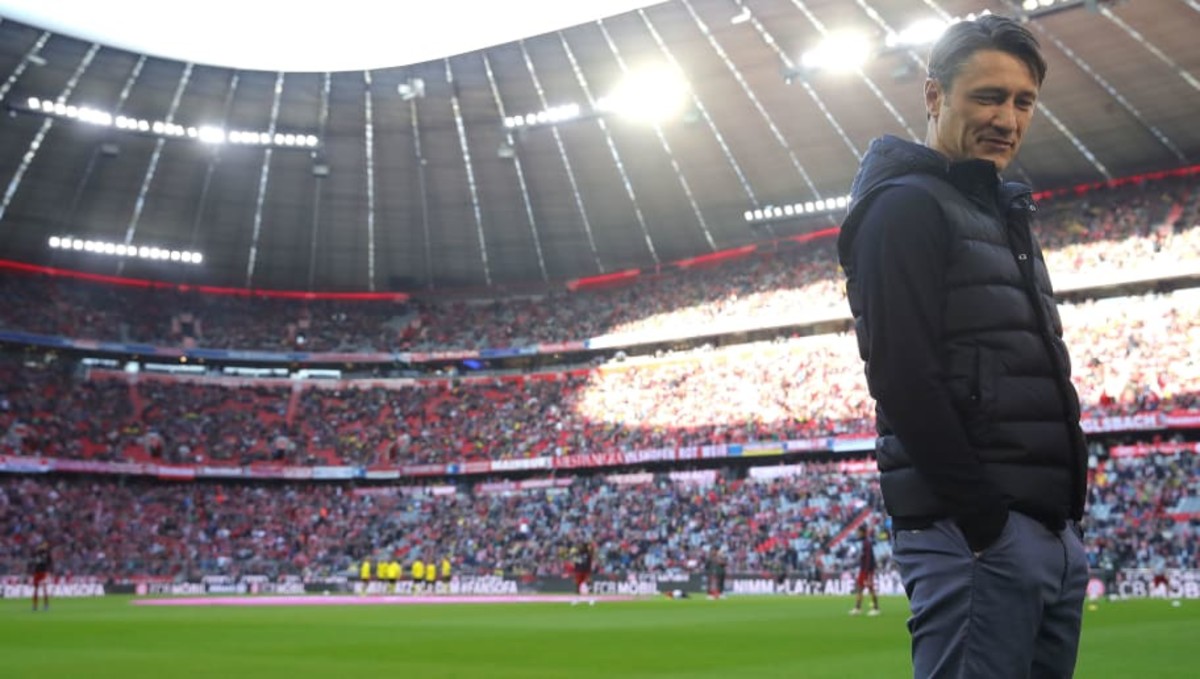Niko Kovac: Why Bayern Munich's Manager Deserves to Be Kept on Regardless of Bundesliga Outcome

It's been a tough year for Niko Kovač in his first season under the spotlight at Bayern Munich.
The club have found themselves in a title race for the first time since rivals Borussia Dortmund last lifted the Meisterschalein 2012, while their journey in the Champions League came to an abrupt end in the first round of the knockout stage.
And while their perceived 'failings' on the pitch has left many to call Kovač's future into question, the 47-year-old's success which landed him the job in the first place should still offer the Croatian a mandate to be in the dugout in Bavaria.
In a lesser extent to what Unai Emery has faced at Arsenal, Kovač had an impossible job of succeeding one of European football's most successful managers and a certified Bayern Munich legend, Jupp Heynckes.
But it was his work with Eintracht Frankfurt which convinced the Bayern Munich hierarchy that Kovač was the right man for the job, not just his close relationship with Bayern's sporting director and former teammate Hasan Salihamidžić.
Even earlier in his managerial career, Kovač planted the seed that he could one day take over at his former club. He spent two years in charge of the Croatian national team, guiding the likes of Luka Modrić, Ivan Rakitić and Bayern's own Mario Mandžukić during the 2014 World Cup tournament.
While their performances on the pitch in Brazil left a lot to be desired - they only beat Cameroon during the group stages - his work with Croatia's biggest players (and egos) offered fans an insight into a potential future at the Allianz Arena.
But it wasn't until Kovač landed his first ever job as a manager in senior club football in Frankfurt that the Croatian really started to make a name for himself.
He was brought in in the latter stages of the 2015/16 season and helped keep the club in the Bundesliga by the skin of their teeth, finishing three points above the automatic drop before beating FC Nürnberg 2-1 in the two-legged relegation play-off match.
Kovač's next test came during the summer transfer window, as first-team goalkeeper Kevin Trapp upped sticks to join Paris Saint-Germain.
In his place, Lukáš Hrádecký was brought in from Denmark for just €2.5m, while Mijat Gaćinović - now a regular part of their senior squad - was plucked from relative obscurity for half that amount.
In his first full season in charge, the Eagles registered a solid mid-table finish, but it was their run in the DFB-Pokal which was the most impressive, only coming unstuck in the final against Borussia Dortmund.
Another impressive summer followed, as Ante Rebić, Jesús Vallejo, Marius Wolf and Omar Mascarell arrived, while only (with the benefit of hindsight at least) Luca Waldschmidt's exit has come back to bite them on the backside.
The 2016/17 campaign wasn't the only time that "Berlin, Berlin, wir fahren nach Berlin" would be heard around the Commerzbank-Arena either, as the following year Eintracht Frankfurt once again found themselves walking out in a cup final at the Olympiastadion.
This time, Frankfurt had an eighth-place finish to their name in the Bundesliga, but they knew that only winning the DFB-Pokal final against Kovač's future employers - he was announced as Heynckes' successor at Bayern Munich some two months earlier - would guarantee Europa League football for them.
Bayern Munich were the favourites, but Rebić's early goal set the tone for a potential giant killing. Robert Lewandowski levelled the scoreline shortly after half-time, but Rebić popped up once again with 10 minutes to go to swing the pendulum back in Frankfurt's favour.
Then, with every Bayern Munich player attacking a late set piece, the aforementioned Gaćinović broke away, ran the entire length of the pitch before rolling the ball into an empty net.
It was pandemonium in the capital. The Eagles were in Europe. And Kovač's parting gift? Ending a 30-year wait since Eintracht Frankfurt last won the Pokal.
Within the blink of an eye, Kovač had gone from a bold managerial appointment at Bayern Munich to an inspired one, and only now are the Bavarian giants enjoying the fruits of their labour.
Despite a nervous start to this season, Bayern Munich have been back to their best for the majority of the Rückrunde. They've been blowing teams away like Gladbach, Wolfsburg and even Borussia Dortmund, whilst also edging past Werder Bremen and Augsburg.
It hasn't been vintage, but Kovač hasn't been brought in to replicate the short-term success of Pep Guardiola (at his best) or Heynckes (at his best).
Instead, he's been brought in to set up the foundations of Bayern Munich's new generation of players for tomorrow's managers to dominate in Europe for another generation.








